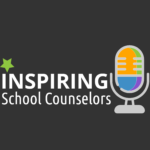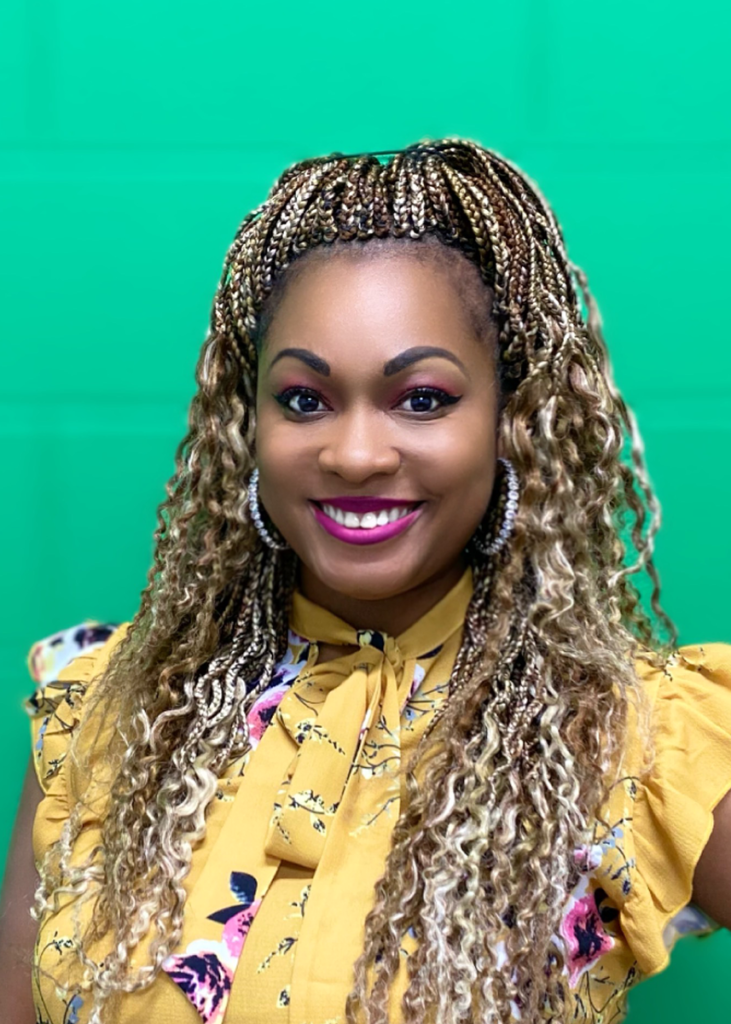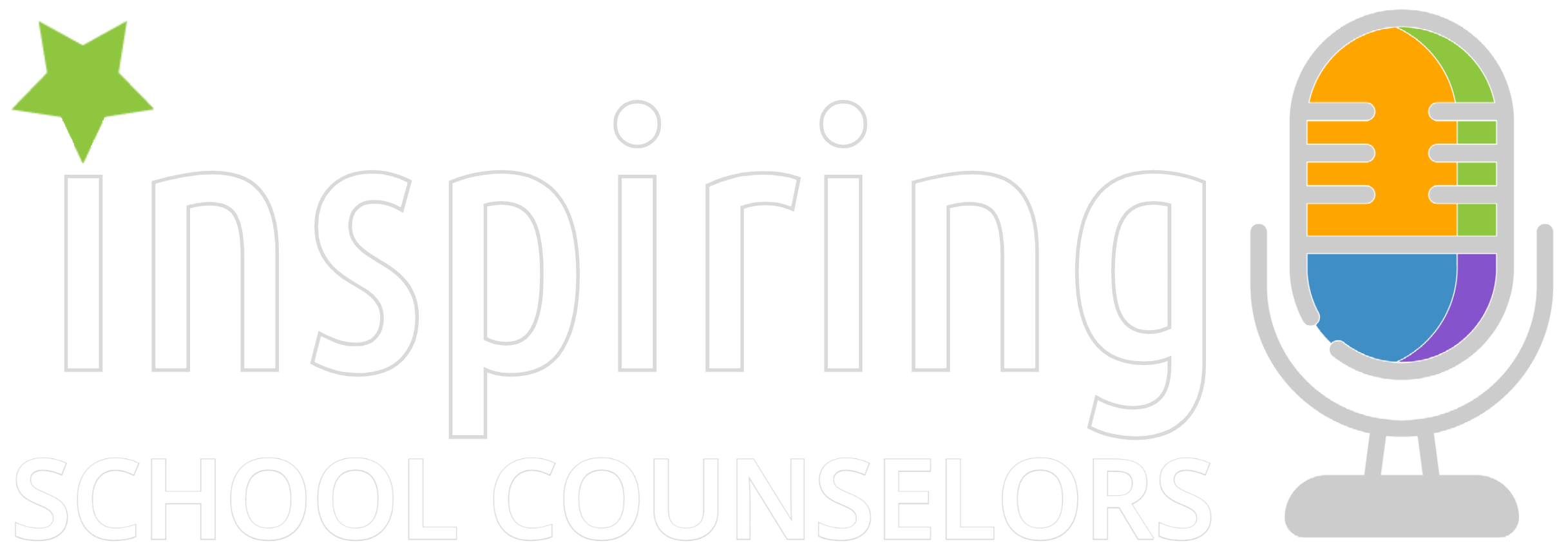With only five years under her belt as school counselor in Texas, Ashley Wright has already been recognized as an outstanding school counselor. Listen in this week to discover the two resources Ashley says are key to her success, her practical tips on working with teachers and community partners, and why her students lovingly refer to her as Counselor DJ Ash-Bash!

About Ashley Wright
Ashley Wright is in her fifth year as an elementary school counselor in Texas after teaching for nine years previously. Ashley was recognized as ASCA’s 2022 school counselor of the year finalist after being named the Texas School Counselor of the Year in 2021. Born and raised in Houston, TX, Ashley Wright currently serves as an elementary school counselor in Conroe ISD at Lucille J. Bradley Elementary. Using her comprehensive counseling program, Ashley teaches students to accept diversity, increase their self-esteem, build character, and maintain resilience.
Find Ashley on social media:

Resources
Ashley recommends these resources:
- Solution-Focused School Counseling “The Missing Manual”, Russell Sabella, PhD
- The School Counseling and School Social Work Treatment Planner, Second Edition, by Sarah Edison Knapp, David J. Berghuis, Catherine L. Dimmitt
We Want to Hear from You!

What’s your best advice for other school counselors? Who has influenced you? What books do you recommend? We want to know! Please take a few minutes to complete the Inspiring School Counselors form.
Subscribe
Inspiring School Counselors is available on these podcast apps and others. If you can’t find the podcast on your favorite app, let us know and we’ll make sure we get there. If you prefer to listen in your browser, visit https://inspiresuccess.org/podcast every week for a new episode. For new episode notifications and more, follow Inspire Success on Facebook, Instagram, or Twitter.
Transcript
A rough transcript follows.
Matt Fleck:
Hey, welcome again to the Inspiring School Counselors podcast, where we ask school counselors at all grade levels from around the globe to share with us their best ideas, favorite resources, and practical tips. I’m Matt Fleck, along with my colleague Aimee Portteus, who talks this week with Ashley Wright. Ashley is a former teacher and has only been an elementary school counselor for five years, but she has already been recognized as the state of Texas’s School Counselor of the year and was selected this year as a finalist for ASCAs National School Counselor of the Year distinction, as Aimee noted when she talked with Ashley. That’s pretty impressive.
Ashley Wright:
I’m very happy and blessed to have the platforms that I have to inspire others because I want to turn outward and say, like, you can do it too. Like, it’s not just me, but you can do it too. And here’s how I did it. Um, but I’m very, as you can tell, um, just passionate about being a school counselor. Like it’s my favorite, favorite thing and I’m so glad that I’m in this position now.
Aimee:
That’s awesome. Well, that kind of brings me to one of your survey questions, which was really cool, was in the last five years, what new belief, behavior, or habit has most improved your life? And I loved your answer that my gift to school counseling is a part of my purpose for my existence here in life and I’m leaving a legacy. Can you talk about that a little bit?
Ashley:
Yes. Um, for me, I always tell people, you know, I felt my calling as a teacher. Um, I felt very connected to my students within the classroom and I was the SEL teacher, the music teacher, removing and grooming, dancing, teaching. And I, and I still miss teaching, but my heart was always drawn to all kids on our campus. It didn’t matter if they were, you know, part of our bilingual community or, um, in a different grade level. It’s just like when I see kids I light up and I love pouring into them. You know, part of my gift, um, and my talents that I possess is I’m able to be that role model for them to be that role model for our parents to be the role model for staff teachers in creating this preventative, resilient, loving culture. And it doesn’t always have to be so negative. Cause I feel like counseling sometimes gets that stigma, you know, something bad has happened. But really, um, school counseling for me is just how to tackle life.
Aimee:
One of the things you said you liked was doing morning announcements where you bring joy and music and positive words. What’s that like?
Ashley:
So, um, around my campus, um, my kids sometimes call me counselor DJ Ash Bash, um, <laugh>. Cause I’m always dancing, I’m always moving and grooving. I’m always, you know, uh, turning on the latest jams. Um, my principal knows I’ll try to make her dance. Um, sometimes you can see me floating through some hallways with my karaoke microphone, um, and just acting silly. And then on morning announcements we have, we call it Friday, um, dance party. Um, sometimes I’ll bring kids on to dance with me. And so it’s stream campus wide. We have a thousand students at our school currently, so all of the kids throughout the entire campus get, um, to see us, you know, have fun. And I think that that’s a, you know, really important Aimee, because I find myself telling a lot of my colleagues and other professionals and stakeholders that our schools need to be much of an experience, not just this system where I enter I’m, you know, working so hard.
Um, and it’s just like drill and kill, you know? Like it needs to be an experience, it needs to be like a Disney World. I’m with you eight hours of the day. And so from the morning to the time I go, um, the kids, I want them to feel like this is like their second home. And for most kids it is, you know, their second home, um, to where they feel safe, where they feel love, where they feel valued. But most importantly, I’m learning. And even through my struggles, I’m still having fun. Um, I think we’ve kind of gotten away from that as a society with a lot of our challenges that have happened. And so part of my role at my school, bringing the dancing and the fun, it’s just like, Hey, let’s lighten it up. Let’s groom. You know? And even if you’re not a dancer, like it’s so funny, Aimee <laugh> walk up to a student, you, they don’t dance. I’m like rubbing on their shoulder, you know, like, give me a shoulder, give me a elbow, give me something, you know? Um, and they’ll kind of giggle cause I’m like, it’s okay to laugh, you know, Just have some fun even if you don’t know the move. So that’s me.
Aimee:
<laugh>. That is wonderful. I am immediately leaving my office and coming to dance with you! That sounds like a lot of fun.
Ashley:
Yes. You should
Aimee:
<laugh> I did wanna talk about that. You, um, mentioned that solution focused counseling and treatment planner for school counseling.
Ashley:
Yes. Yes. I am a big fan of Russell Sabella, uh, Professor Russell Sabella. Um, he’s amazing <laugh>.
Aimee:
He’s been on our podcast.
Ashley:
Yes. I just love his excitement for the, you know, school counseling profession. And I think as a school counselor, you know, it’s a little different in private practice where, you know, you’re a licensed professional counselor, you kind of hone in maybe on one technique, um, you know, through all of your interventions with the clients, you know, to keep that consistency. But when you work in a school, you have different students, different personalities, different systems and different just backgrounds and different environments that we all have to account for. So where one technique in my personal professional opinion may work with this student, it may not work well with another student. But what has remained consistent that I’ve noticed through my five years is the solution focused <laugh>. Um, just because of, you know, the time. Um, just because of the level of comprehension. Like especially when you’re, you know, dealing with, you know, the primary grades.
I also like the treatment planner for elementary school counseling cuz I think with a lot of issues, um, a lot of different disabilities that we’re finding, which is I think amazing that parents are becoming more aware of, um, mental health and more accepting. But as we become more accepting of mental health as these kids are getting diagnoses and you know, their private setting and coming into the school, I do believe that counselors need to have tools and strategies on how to deal with students for where they are within their disabilities. I feel like that’s really, really important. And so that treatment planner actually kind of list <laugh> of just lots of different peer reviews, different solutions and strategies that you can try. And I just love reading that. Like, here’s somebody that’s struggling with this. Here may be some things that you can do or if you can research just so that you’re not just, you know, relying on your own advice. Because like I said, you know, schools are like a cafeteria. We’ve got many different students that come from many different places. And so, um, I just like having both of those resources as my toolkit. <laugh>.
Aimee:
That’s awesome. Thank you for sharing that. Um, two things that kind of came to my mind while you’re talking about this. What, what is your role then, uh, between the student and their teacher?
Ashley:
I think it’s really important for my role as a school counselor to be the liaison and be the voice for the kid to say, you know, Hey Miss Such-and-such, let’s come in and let’s have a consultation regarding like, this is what our student, our student is dealing with. And so here are some strategies and interventions that may work. And I think also, um, me being a liaison for our teachers, I’m always asking my teacher, what’s, what’s your input because you’re in the classroom, right? So I’m not, but I’m here. I am your cheerleader. I’m both of y’all’s cheerleader. You know, my students are first and you are secondary, but I want you to know that we are like working all together. Um, and Aimee, I also include my admin a lot in these conversations and my parents because it takes a village.
And so while we just look at the kid, we have to look at all of the cheerleaders behind the kid. And so it’s really important to admins on the same page on some interventions and strategies that the teacher’s doing. So we can support the teacher as well as supporting the kid. Um, and then also the parent. And so a lot of that comes from me having conferences with the teacher, me having conferences with the admin, teachers and counselor having a conversation. And then at the end – my most favorite part – is when I bring the student in, um, and he sees or she sees everybody on the same page rooting and saying, “Hey, we know that this is it, but this is how we’re gonna help you.” I just, just think it’s a beautiful thing cuz kids are mind blown when they see, oh, all of y’all talk to each other. <laugh>. Yes we do <laugh> and we’re all here for you and this is what we’re gonna try. And if it doesn’t work, that’s okay. We’re gonna keep going. That’s why you’re in school cuz we’re learning and growing together. So I’m a very, um, big person on, and I say this a lot for my platform school connectedness because nothing can be done in isolation. And I think it takes everybody involved.
Aimee:
Absolutely. Extend that just a little bit then. What’s your role with the community mental health agencies in your area?
Ashley:
Yes. Great. Um, so through our district, um, we get lots of different resources as far as referrals and different private practices that will give us information. And so if a parent is, you know, seeking services, I do refer out, I will, um, send an email over some places. Sometimes I may contact the place, find out, you know, about insurance, how much it costs, You know, Ooh, Aimee, this is really important. So I guess so excited. Also helping parents understand the many different, um, languages of mental health, right? Because there’s psychiatrists, there’s psychologists, there’s the school counselor, there’s therapists. And so in a nutshell, I’ve heard from a lot of my parents, they said, I love Ashley. How do you break it down on who does what and how? And saying that all these people are amazing. I actually hold their hand and say, “Do you need me to call? What can I do to help you?”
Aimee:
Yeah, that partnership. That’s awesome. So Ashley, how do you take care of yourself?
Ashley:
I work out and so I like to work out in the morning. I like to have my quiet time, you know, based on my personal faith as a Christian. That’s just kind of how I’ll, you know, withdraw within. Like I said, I am kind of a gym junkie. Like, I like to work out and release. I like to dance <laugh>. That’s my outlet, move and groove in the car. I am a very big music person. I also like to listen to different motivational videos. I just love that positivity in my mindset. It just kind of helps me feel like, ugh, I’m not the only one. And it gives me the resilience that I need to just move forward and press on. And so that kind of feeds my bucket. Um, another thing at work, if I start to feel down, it never fails. Oh my gosh, Aimee, it never fails. Like if I start to think negatively or feel down and just feel really fatigued, I’ll walk in the hall and kids will come running up to me and say, I love you, Miss Wright! You must look pretty. You done, Miss Wright. It just literally lifts me up and then helps me and I mean, reminds me that this is my why. This is part of my purpose. You know,it’s an excellent time to be a school counselor right now, even when it’s hard because the world is watching. What do we do? What do we what, what do we do? And so while everyone’s watching us as school counselors, what do we do in a world that may be chaotic right now? We have the momentum to really transform minds, to renew some hearts to show people the right way. And so let that light of fire within you to do that. And just to keep going and to keep pressing, keep loving, keep serving. I know I said a lot, but I’m telling you like, just don’t lose your joy.
Aimee:
You make me wanna say amen. <laugh>.
Ashley:
Yes.
Aimee:
Well, thank you so, so much for spending some time with me today.
Ashley:
Yes, ma’am.
Matt:
And I’ll add my thanks to Ashley Wright, school counselor of the year in 2021 for the state of Texas, for sharing her passion and ideas with all of us. If you would like more details on the resources Ashley and Aimee discussed, you’ll find them on our podcast website that’s at inspire success.org/podcast. Or you’ll also find a trove of other resources. And while you’re there, you can also rate us, subscribe to the podcast or share your list of favorite resources. That’s it for us. Hey, thanks for joining us. We’ll see you next time.
